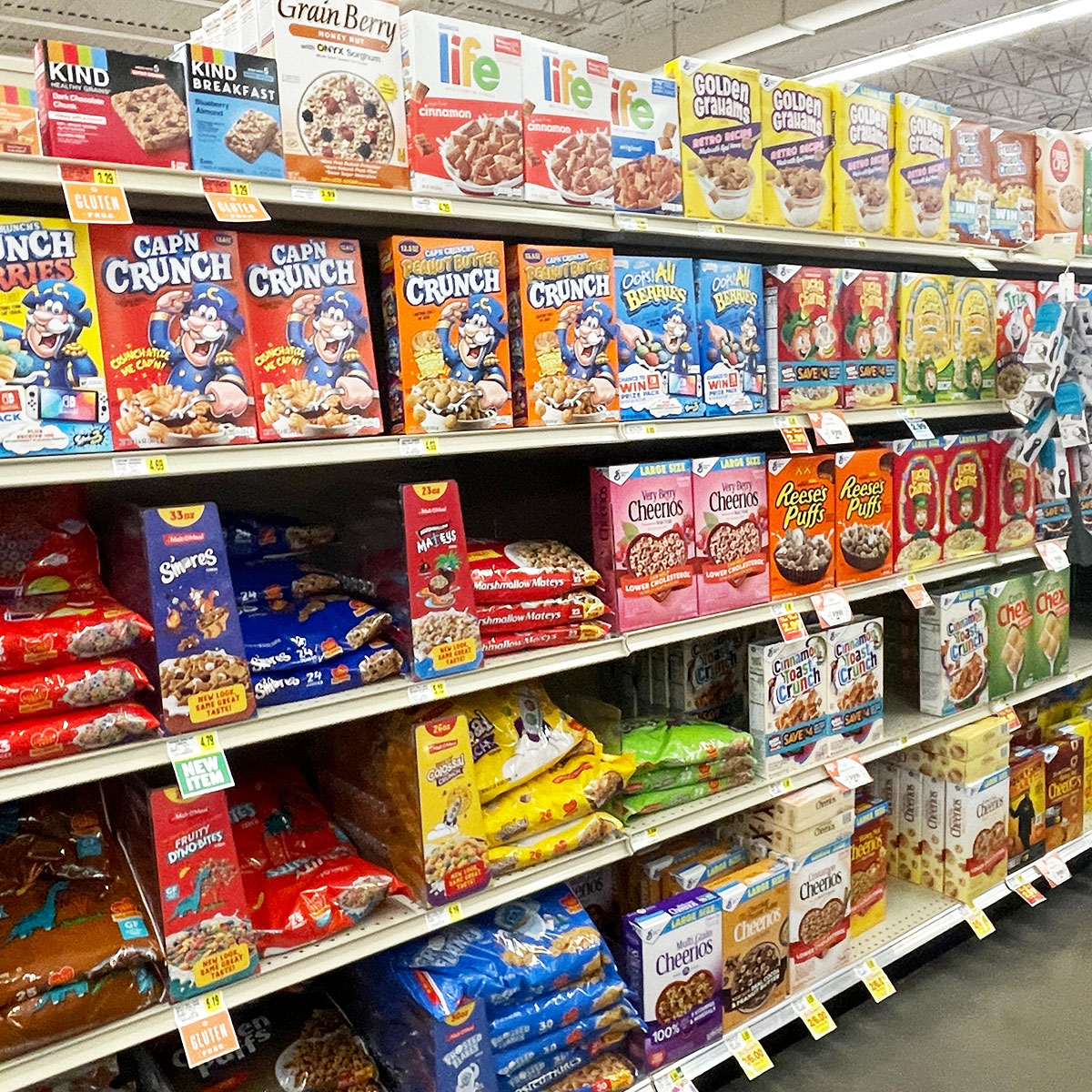When cravings strike at home, the pantry is likely one of the first places you search for food options galore. Whether you’re looking for a quick snack or some simple grains to prep for dinner, our pantries are often a treasure trove of tasty, convenient foods—but unfortunately, many of the staples we keep stocked aren’t the best choices for our health. The highly processed foods you store on your shelves can oftentimes contribute to problems like inflammation, weight gain, and metabolic issues. Knowing which ones to leave out of your cart at the grocery store and choosing healthier alternatives is one good way to keep an eye on your overall wellbeing.
To shed some light on a few potentially detrimental options to steer clear of, we checked in with health experts. Read on for expert insight on which items to leave out of your next pantry restock if you want a slimmer waistline, from breakfast cereal to processed muffins. Find it all below.


1. Cereal
Breakfast cereal, with its wide range of options, has long been a staple of the morning routine for many. These convenient and often tasty breakfast foods seem like a quick, yummy way to kickstart the day. However, it's essential to consider the link between breakfast cereal and weight gain, along with other health problems such as a sluggish metabolism and insulin resistance.
While some boast of their health benefits and whole-grain goodness, others hide excessive sugar and refined carbohydrates behind clever marketing.
"Cereals are often very high in sugar and low in fiber, which means they pass through your digestive system quickly. Fiber keeps you feeling fuller for longer, which helps control your food intake and prevent weight gain. It also causes slower digestion which means a slower release of energy into your bloodstream throughout the day. Even brands like Special K and Life, which are heavily marketed as weight loss friendly cereals, have the same low amount of fiber found in the common sugary brands like Frosted Flakes," Destini Moody, registered dietitian and certified specialist in sports dietetics, notes.

2. Cheese puffs
While cheese puffs come in a variety of flavors, from classic cheddar to spicy jalapeño, their nutritional profile remains largely the same—and it's not a good one. Often made from highly processed cornmeal or other refined grains, cheese puffs are typically loaded with unhealthy fats, sodium, and artificial additives.
These ingredients, combined with their high carbohydrate content, can lead to rapid spikes in blood sugar levels and contribute to insulin resistance over time.
Additionally, the excessive consumption of refined carbohydrates and unhealthy fats found in cheese puffs can disrupt metabolic function, leading to a slowed metabolism and increased fat storage, ultimately contributing to weight gain.
"Cheese puffs and similar cheesy snacks are often made with partially hydrogenated oils, which contain trans fats," Mary Sabat, MS, RDN, LD warns. "These trans fats raise bad cholesterol (LDL) levels and lower good cholesterol (HDL), contributing to arterial plaque buildup."
"These cheesy snacks are not only highly processed but also contain high levels of saturated and trans fats. Regular consumption can lead to elevated cholesterol levels, arterial inflammation, and the buildup of fatty deposits in the arteries," she states.

3. Cookies
Laden with refined sugars, unhealthy fats, and artificial additives, regular consumption of cookies can contribute to insulin resistance, a sluggish metabolism, and unwanted weight gain.
Valeria Dolbel, founder of Beauty Diets, says treats like pies, cookies, and cakes "are the food category that contributes the most calories accounted for added sugar intake yet provide little to no nutritional value."
"Low fiber and highly refined grains increase the risk of weight gain and higher levels of belly fat," Dolbel explains, adding that your favorite cookie likely "causes belly fat due to highly-processed ingredients such as butter, sugar, and refined flour."

4. Candy
Despite the wide array of flavors and varieties available, from fruity gummies to rich chocolates, candies cause a rapid spike in blood sugar levels, leading to increased insulin production to help regulate glucose levels.
Moreover, the high calorie content of candies, often devoid of essential nutrients, can contribute to a slowed metabolism and increased fat storage, ultimately leading to weight gain.
Sabat elaborates on candies by pointing out their high-sugar, low fiber content and artificial ingredients. "Most candies contain high amounts of added sugars, such as sucrose and high fructose corn syrup. These sugars can feed harmful bacteria in the gut, leading to an imbalance in the gut microbiome. An overgrowth of harmful bacteria can result in digestive issues, inflammation, and compromised gut health. Fiber acts as a prebiotic, nourishing beneficial gut bacteria and promoting a balanced gut microbiome. Without enough fiber, the gut's ecosystem can become imbalanced, potentially leading to gastrointestinal problems," Sabat states.

5. Doritos
Chips like Doritos can throw a major wrench in your weight loss goals. These crunchy treats a staple in many snack cabinets, but they're a highly processed, inflammatory snack that comes with potential health consequences. Packed with refined carbohydrates, unhealthy fats, and a laundry list of artificial ingredients, these crunchy snacks are to be avoided for several reasons.
"They are often fried, made with inflammatory omega-6 oils, refined carbohydrates, and a combination of fat and carbs that cause oxidative stress in the body," nutritionists Trista Best from Balance One Supplements explains.
"Doritos are one of the worst types of chips to consume, regardless of flavor." As Best points out, "They are made with artificial colors and flavors along with refined carbs. This form of carb causes a rapid increase in glucose, which also increases the body's fat-storing rate."

6. Granola Bars
Granola bars, often believed to be a healthy on-the-go snack, typically don't actually live up to their nutritious reputation. Despite their convenience, many store-brought granola bars are packed with refined sugars, processed grains, and hidden fats, potentially leading to inflammation and metabolic issues.
"Granola bars are the worst 'healthy' food for weight loss because they are full of inflammatory ingredients that prevent weight loss, including refined sugars and grains. Many food manufacturers claim that their granola bars are healthy because they contain oats, but the added ingredients in granola bars are what makes them so unhealthy," says Heather Hanks, a nutritionist at Medical Solutions Barcelona.

7. Donuts
Who doesn't love to indulge in tasty donuts? That fluffy texture and sugary glaze is difficult to resist—but they're bad news for your body. Often fried in unhealthy oils, donuts are a double whammy of refined carbohydrates and trans fats. These ingredients, combined with the frying process, create a perfect storm for health issues such as inflammation and a slowed metabolism.
Refined carbohydrates, found in the dough, rapidly spike blood sugar levels, leading to insulin resistance over time as the body struggles to manage glucose effectively.
Richards states that "donuts have a high content of refined sugars, unhealthy fats, and processed ingredients. They are typically made with refined wheat flour and packed with added sugars, causing a rapid rise in blood glucose levels when consumed. This sudden spike in blood sugar triggers a corresponding surge in insulin to regulate sugar levels, which can be harmful to the body in the long term and lead to insulin resistance."

8. Muffins
Similar to donuts, many store-bought muffins are loaded with refined sugars, processed flours, and unhealthy fats, regardless of their flavor variety. Whether it's blueberry, chocolate chip, or banana nut, these muffins typically contain high levels of refined carbohydrates, which can quickly spike blood sugar levels and contribute to insulin resistance over time.
"You may call them muffins, but my brain says, cake. Whether they're from a bakery or a box, traditional muffins are high in calories and fat, which could lead to belly fat over time. Some of them contain over 350 calories per muffin," Lisa Andrews, MEd, RD, LD, a registered dietitian nutritionist, warns.


























